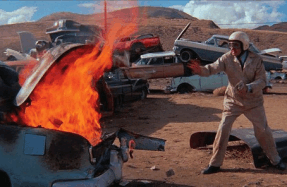Everything Transitory Is But an Image


When Goethe wrote his Faust, adapting the German legend about a scholar who makes a pact with the Devil to attain total knowledge, could he have foreseen how incisive his indictment of human hubris would be across epochs? How durable his critique of the Enlightenment would be, not only for his age of skepticism but also our own? In cinema, which benefited from pre-established knowledge in theatre, poetry, and prose, the Faust legend occupies a privileged place, ranging from Murnau’s indelible late-silent masterpiece to Sokurov’s Golden-Lion-winning reimagination of versions by Goethe and Thomas Mann in 2011. As early as 1903, Edwin S. Porter and Alice Guy-Blaché had adapted the supernatural tale, using its stable of fantastical imagery—demons and dames, murder and lust—as a subject of their films. Drawing inspiration from differing interpretations of the story (Porter adapted the Gounod opera, while Guy-Blaché’s borrowed more from Marlowe), these brief, playful trick-films experiment with near identical gimmicks: Mephistopheles, the story’s Lucifer stand-in, conjures miracles in and out of existence as jump cuts transport characters across the proscenium, aging and de-aging Faust with the wave of a hand, tempting him with the seductive Margueritte only to have her teleport offscreen in an invisible edit’s instant. Over one hundred years later, the effect is somehow still stimulating, instructive, and surprising. Altering reality through the simple stop-start action of its mechanism, exemplifying how the camera can see in ways we naturally cannot, cinema had joined forces with the Devil.
“Most people want to be kings and queens, but not enough want to be Faust.”
—Jean-Luc Godard, Le livre d’image
However unrelated it might seem to the films of Porter and Guy-Blaché, Andrea Bussmann’s hybrid ethnography subscribes to a similar thesis: too often burdened with the prerogative of verisimilitude, cinema (made in collaboration with Nicolás Pereda) is a direct, rigorous, and largely theoretical adaptation of Goethe’s that wholeheartedly adopts that text’s anti-empiricist ideals. It’s a portrait of a place and its inhabitants (deceased or otherwise) caught in limbo between what is and what was. In hushed narration, local myths commingle with the narrative, while the images, shot digitally and transferred to 16mm, open onto a pre-colonial world, when land and capital were not so synonymous. (Much of the film could have been shot a thousand years ago, if photography had existed; the palette would be the same.) The landscape is treated as a wholly syncretic being unto itself, shapeshifting according to the perspective of those looking at it: Alberto, who is rumoured to be engaging in an unending building project similar to Faust in the final act of Goethe’s saga; the plethora of animals (dogs, cats, horses) whose perceptions differ from our own; the omniscient narrator (Gabino Rodríguez), who speaks exclusively in the past tense, recounting tales of disembodied shadows that roam the land, of colonizers that engage in a lustful search for an indigenous woman; or Christopher Columbus, who, according to the legend recounted in the film, put the literal fear of God into local tribes with his seemingly prophetic foreknowledge of a lunar eclipse (though the historical event is said to have taken place in Jamaica).
You’re reading a preview, subscribe to read more.
Start your free 30 days





